Any retailer who thinks they're not getting the most out of their epos system may need to spend more time on it
As kids we all watched films in which computers were going to take over the world. Thankfully, that hasn't actually happened, although using
a computer has now become a way of life for many people. In retailing, those computers are epos and back office systems. The companies behind these machines tell us how much time and money they can save, however it's not a case of 'plug it in and get on with it' - making epos work for you takes a bit more effort than that.
Pete Cheema, who has three Spar stores in and around Dundee, reckons you get out of epos only what you are willing to put in. "We couldn't operate without epos. It gives us price control, stock control and all the purchase data we need. If people aren't willing to invest time in keeping the data up to date and taking downloads, then they won't get as much out of it. We're using ours as much as we can."
Pete uses an IPS system linked to his wholesaler, CJ Lang. "This means we get weekly updates on prices and recommended selling prices. We are also linked directly to other companies such as Ferrero and Mars Snackfood, which means they can trial new products in our stores and they'll get data and feedback.
"Invest time in epos and it will save you time and money," he says.
Vic Grewal has three stores: two Budgens, one at Chorleywood and one at Flackwell Heath, High Wycombe, plus an independent store in Harrow. He has epos at the two Budgens store and is considering putting it into the independent shop. Budgens offers two approved epos suppliers: Torex and Indigo. "We use the Indigo systems in both stores," says Vic. "It's a brilliant system as it streamlines everything. We are much more in control and it has made a big different to how we work. It's good to know, for instance, that we are charging the right prices - we are not overcharging and losing customers, neither are we undercharging and losing money."
However, Vic says he really needs to sit down and go through the system thoroughly because he reckons he's getting only 70-75% capacity from it.
Torex chairman and chief executive officer Mike Greenough says many retailers use just a fraction of the capabilities of their epos system. "Some are used just as a basic cash register and this is a waste of what is sometimes an advanced software solution."
Michael Newman, managing director of Pacific Retail, agrees that in general retailers do not invest enough in their epos. "Implementing the system takes commitment and planning; and then someone has to be responsible for keeping the system healthy," he says.
Greenough adds that training can be a major factor in the under-utilisation of a system and says this is compounded by the high turnover of staff that is often seen in c-stores. "When the solution is first installed, comprehensive training is given, but this tends to get more and more diluted as staff are replaced and the training is then conducted by other staff members rather than the professional services of the equipment vendor."
Torex offers refresher training for staff who need to brush up on the system. However, he says only a few retailers request any additional training because of the cost.
Indigo Retail commercial director Neill Friend agrees that training is important: "Refresher training once the user is familiar with the system can really improve the benefits to the retailer. We monitor all support calls of a training nature and if a customer has a high number of these we offer to meet with them again to provide refresher training," he says.
Meanwhile, retailer Vic also believes he needs more programs: "We need to be able to produce more reports. For instance, the banks want monthly or quarterly profit-and-loss reports and our epos system can't produce these; we have to go to our accountants for them. I think this is something the epos system should be able to do."
Actinic chief executive officer Chris Barling responds: "This chap should buy an accounts system. The function of epos is to simplify the sales process and make it more efficient. It takes care of stock management at the same time. However, an accounts system is principally designed to provide accounts and has many features relating to things such as depreciation, accruals and sometimes payroll. In other words, they are different systems addressing different needs. Because accounts systems apply to all businesses they have a larger user base than epos systems, which just apply to retailers. For that reason, accounts systems have better economies of scale. Their development cost is spread across more sales. Building full accounting features into an epos system would be more convenient for the retailer, but it would likely offer far worse value for money."
Aberystwyth-based Spar retailer Geoff Garrad's only gripe with his epos is that it doesn't respond quickly enough to variations. "We are in a university town so the number of customers rises and falls dramatically throughout the year. But our epos works on a four-weekly cycle so you've really got to keep an eye on it to make sure you take account of holiday times. Generally, it's good, but you have to be aware of sudden surges in sales," he says.
Neill Friend at Indigo reckons his company's real-time epos system, Instore, enables the retailer to avoid any stocking issues from sales surges. "He can re-order stock based on any sales history he wants. For example, he can place an order for the next 14 days of term time based on sales from the last 28 days of term time - or the same in holiday time. Indigo's true sales-based ordering system enables the retailer to keep the shelves stocked and avoid tying up cash through over-ordering."
Actinic's Barling describes Geoff's problem as a classic one: "Many retailers have oddball drivers - for ice cream think sunshine, for umbrellas think rain, for beer think World Cup, for example. More intelligent systems are being developed that can correlate many variables automatically, but as far as I'm aware this type of technology hasn't made it into epos systems yet.
"The problem would be gathering all of the data. Just for the cases mentioned this would involve term times, weather, sporting fixtures and so on. There would also have to be quite a lot of historical data (sales and drivers) before forecasting would start working, and even then the system couldn't say what would happen with new products. As a result, I'm afraid we're stuck with the intelligence and common sense of the store manager. Epos systems may help by providing a graphical representation of historical data at product and product line level, but human judgement is still needed."
Finally, one question Barling would like to ask retailers is why so many are still without epos. "This is despite the fact that, in many cases, epos would pay for itself in three months by reduction in inventory, without a reduction in service. If you go to the US, epos is much more widely deployed," he says.
Pacific Retail offers its StoreTrader customers a service through which retailers can keep their store servers in-house, but the company 'shadows' them to its own secure server and from there monitors the health of the system, so a retailer doesn't need IT specialists.
The company's managing director Michael Newman explains: "This data represents a real-time back-up of their entire system so that even in the event of a complete disaster they can continue to access it. Then we provide (for a low monthly fee) access to all this company-wide data from any authorised PC user with any internet browser, and no additional software. So operations reports (like the cash drawer report) and management information in the form of 'dashboard' (graphical) data are available anywhere, any time. And as broadband and internet reliability and security improves, we'll support full pos operations online so the retailer needs only the simplest of tills in his shops and everything else is handled in our secure data centre."
The UC VCO GPOS solution is a pos terminal and scale in one unit, designed to save retailers space and money. The machine is a collaboration between Mettler Toledo and Fidelity POS Software. Mettler Toledo retail business manager David Jagger explains: "The UC VCO allows the retailer to utilise two 'best of breed' solutions in one small footprint."
Panasonic System Solutions Europe has launched the JS-950 Stingray, which it believes will "transform the epos market thanks to its flexible open architecture and versatile modular construction" together with its low cost.
The open platform means the Stingray can evolve with the business as it allows both software and hardware upgrades at any stage in its lifetime. Meanwhile, its open architecture means it will run virtually any operating system - from basic off-the-shelf options to custom pos applications.
It has a high-speed processor and up to 2GB of built-in RAM, which means it is ideal for standalone applications and can be integrated into a LAN network to run a back-office operation. In addition, Stingray is backwards compatible, allowing operators to replace one workstation at a time for maximum cost-efficiency.
It features replaceable components - allowing users to easily increase RAM, swap or change hard drives, remove/replace the LCD display, switch the 15in LCD display from landscape to portrait, add a card reader in the position they want, or add security devices.
Chris Barling, chief executive officer of Actinic, reckons payment systems will be one of the most exciting developments in the next year or two. "In Japan, it's common for people to be able to pay through their mobile phone. With contactless technology pioneered by the London Oyster card, and the new PayWave credit card being trialled too, we should finally see quicker and easier payment, not only of large amounts, but small transactions as well. When this is combined with a mobile phone, things will really have moved forward," he says.
As kids we all watched films in which computers were going to take over the world. Thankfully, that hasn't actually happened, although using
a computer has now become a way of life for many people. In retailing, those computers are epos and back office systems. The companies behind these machines tell us how much time and money they can save, however it's not a case of 'plug it in and get on with it' - making epos work for you takes a bit more effort than that.
Pete Cheema, who has three Spar stores in and around Dundee, reckons you get out of epos only what you are willing to put in. "We couldn't operate without epos. It gives us price control, stock control and all the purchase data we need. If people aren't willing to invest time in keeping the data up to date and taking downloads, then they won't get as much out of it. We're using ours as much as we can."
Pete uses an IPS system linked to his wholesaler, CJ Lang. "This means we get weekly updates on prices and recommended selling prices. We are also linked directly to other companies such as Ferrero and Mars Snackfood, which means they can trial new products in our stores and they'll get data and feedback.
"Invest time in epos and it will save you time and money," he says.
Vic Grewal has three stores: two Budgens, one at Chorleywood and one at Flackwell Heath, High Wycombe, plus an independent store in Harrow. He has epos at the two Budgens store and is considering putting it into the independent shop. Budgens offers two approved epos suppliers: Torex and Indigo. "We use the Indigo systems in both stores," says Vic. "It's a brilliant system as it streamlines everything. We are much more in control and it has made a big different to how we work. It's good to know, for instance, that we are charging the right prices - we are not overcharging and losing customers, neither are we undercharging and losing money."
However, Vic says he really needs to sit down and go through the system thoroughly because he reckons he's getting only 70-75% capacity from it.
Torex chairman and chief executive officer Mike Greenough says many retailers use just a fraction of the capabilities of their epos system. "Some are used just as a basic cash register and this is a waste of what is sometimes an advanced software solution."
Time and money
Michael Newman, managing director of Pacific Retail, agrees that in general retailers do not invest enough in their epos. "Implementing the system takes commitment and planning; and then someone has to be responsible for keeping the system healthy," he says.
Greenough adds that training can be a major factor in the under-utilisation of a system and says this is compounded by the high turnover of staff that is often seen in c-stores. "When the solution is first installed, comprehensive training is given, but this tends to get more and more diluted as staff are replaced and the training is then conducted by other staff members rather than the professional services of the equipment vendor."
Torex offers refresher training for staff who need to brush up on the system. However, he says only a few retailers request any additional training because of the cost.
Indigo Retail commercial director Neill Friend agrees that training is important: "Refresher training once the user is familiar with the system can really improve the benefits to the retailer. We monitor all support calls of a training nature and if a customer has a high number of these we offer to meet with them again to provide refresher training," he says.
Meanwhile, retailer Vic also believes he needs more programs: "We need to be able to produce more reports. For instance, the banks want monthly or quarterly profit-and-loss reports and our epos system can't produce these; we have to go to our accountants for them. I think this is something the epos system should be able to do."
Actinic chief executive officer Chris Barling responds: "This chap should buy an accounts system. The function of epos is to simplify the sales process and make it more efficient. It takes care of stock management at the same time. However, an accounts system is principally designed to provide accounts and has many features relating to things such as depreciation, accruals and sometimes payroll. In other words, they are different systems addressing different needs. Because accounts systems apply to all businesses they have a larger user base than epos systems, which just apply to retailers. For that reason, accounts systems have better economies of scale. Their development cost is spread across more sales. Building full accounting features into an epos system would be more convenient for the retailer, but it would likely offer far worse value for money."
Aberystwyth-based Spar retailer Geoff Garrad's only gripe with his epos is that it doesn't respond quickly enough to variations. "We are in a university town so the number of customers rises and falls dramatically throughout the year. But our epos works on a four-weekly cycle so you've really got to keep an eye on it to make sure you take account of holiday times. Generally, it's good, but you have to be aware of sudden surges in sales," he says.
The real deal
Neill Friend at Indigo reckons his company's real-time epos system, Instore, enables the retailer to avoid any stocking issues from sales surges. "He can re-order stock based on any sales history he wants. For example, he can place an order for the next 14 days of term time based on sales from the last 28 days of term time - or the same in holiday time. Indigo's true sales-based ordering system enables the retailer to keep the shelves stocked and avoid tying up cash through over-ordering."
Actinic's Barling describes Geoff's problem as a classic one: "Many retailers have oddball drivers - for ice cream think sunshine, for umbrellas think rain, for beer think World Cup, for example. More intelligent systems are being developed that can correlate many variables automatically, but as far as I'm aware this type of technology hasn't made it into epos systems yet.
"The problem would be gathering all of the data. Just for the cases mentioned this would involve term times, weather, sporting fixtures and so on. There would also have to be quite a lot of historical data (sales and drivers) before forecasting would start working, and even then the system couldn't say what would happen with new products. As a result, I'm afraid we're stuck with the intelligence and common sense of the store manager. Epos systems may help by providing a graphical representation of historical data at product and product line level, but human judgement is still needed."
Finally, one question Barling would like to ask retailers is why so many are still without epos. "This is despite the fact that, in many cases, epos would pay for itself in three months by reduction in inventory, without a reduction in service. If you go to the US, epos is much more widely deployed," he says.
Epos update
Pacific Retail offers its StoreTrader customers a service through which retailers can keep their store servers in-house, but the company 'shadows' them to its own secure server and from there monitors the health of the system, so a retailer doesn't need IT specialists.
The company's managing director Michael Newman explains: "This data represents a real-time back-up of their entire system so that even in the event of a complete disaster they can continue to access it. Then we provide (for a low monthly fee) access to all this company-wide data from any authorised PC user with any internet browser, and no additional software. So operations reports (like the cash drawer report) and management information in the form of 'dashboard' (graphical) data are available anywhere, any time. And as broadband and internet reliability and security improves, we'll support full pos operations online so the retailer needs only the simplest of tills in his shops and everything else is handled in our secure data centre."
The UC VCO GPOS solution is a pos terminal and scale in one unit, designed to save retailers space and money. The machine is a collaboration between Mettler Toledo and Fidelity POS Software. Mettler Toledo retail business manager David Jagger explains: "The UC VCO allows the retailer to utilise two 'best of breed' solutions in one small footprint."
Panasonic System Solutions Europe has launched the JS-950 Stingray, which it believes will "transform the epos market thanks to its flexible open architecture and versatile modular construction" together with its low cost.
The open platform means the Stingray can evolve with the business as it allows both software and hardware upgrades at any stage in its lifetime. Meanwhile, its open architecture means it will run virtually any operating system - from basic off-the-shelf options to custom pos applications.
It has a high-speed processor and up to 2GB of built-in RAM, which means it is ideal for standalone applications and can be integrated into a LAN network to run a back-office operation. In addition, Stingray is backwards compatible, allowing operators to replace one workstation at a time for maximum cost-efficiency.
It features replaceable components - allowing users to easily increase RAM, swap or change hard drives, remove/replace the LCD display, switch the 15in LCD display from landscape to portrait, add a card reader in the position they want, or add security devices.
The future
Chris Barling, chief executive officer of Actinic, reckons payment systems will be one of the most exciting developments in the next year or two. "In Japan, it's common for people to be able to pay through their mobile phone. With contactless technology pioneered by the London Oyster card, and the new PayWave credit card being trialled too, we should finally see quicker and easier payment, not only of large amounts, but small transactions as well. When this is combined with a mobile phone, things will really have moved forward," he says.
















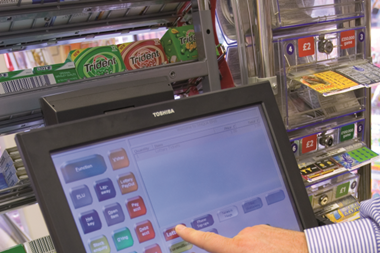

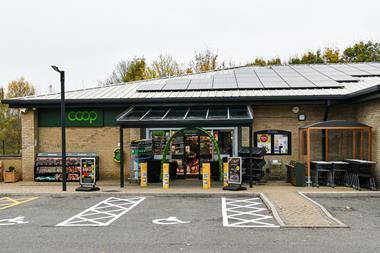
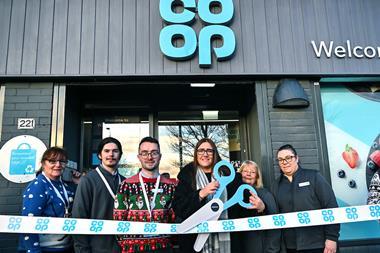

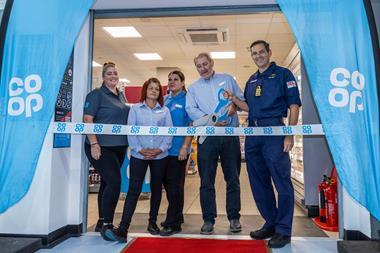

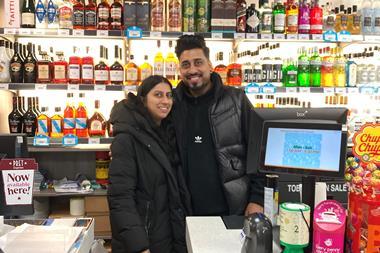
No comments yet